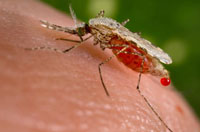
Referring to travellers returning from Mozambique in particular and showing symptoms of malaria, Van Loggerenberg said no one should ever take the threat of malaria lightly.
"Malaria is a major occupational illness, responsible for numerous lost work days every year. Statistics show that every year around 30 000 travellers and expatriates get malaria."
International SOS is an international healthcare, medical assistance and security services company. Through its worldwide network of alarm centres, clinics and health and logistics providers, the company offers local expertise, preventative advice and emergency assistance during critical illness, accidents, or civil unrest.
Van Loggerenberg says business travellers to malaria endemic countries should always remember the ABCD of awareness campaign - awareness, bite prevention, chemoprophylaxis and diagnosis
"Be aware and understand the disease and how to protect yourself. Malaria is spread by the bite of an infected female Anopheles mosquito. The mosquitoes begin life free of parasites, but after they feed on blood of an infected human, the parasites enter the mosquito, multiply and finally enter its salivary glands. When the mosquito bites again, the parasite is injected into the bloodstream of the victim.
"Travellers should also be aware of the initial symptoms, which are often difficult to distinguish from a cold, flu or other gastro-intestinal disease. These may include fever, headache, sweats and chills, painful joints, fatigue, cough, diarrhoea, nausea and vomiting. Symptoms appear ten to 15 days after an infective mosquito bite, but in some instances, symptoms can take several months to a year to appear. It is important to notify your doctor of your travel history whenever you develop 'flu like' symptoms, for up to a year after visiting a malarial area.
"If you don't get bitten by an infected mosquito you cannot get malaria. This is the most important way in which malaria transmission is prevented. Avoid mosquito prone areas like, use effective personal skin insect repellents, cover exposed skin and stay in well-screened, mosquito-free accommodation from dusk to dawn. Use insecticide treated bed nets in rooms that are not mosquito-proof."
Since mosquito bites cannot be completely eliminated, Van Loggerenberg recommends on the basis of medical advice, that antimalarial medication is taken on a regular basis to prevent or suppress malaria symptoms.
"The dose is lower than what is used for treatment, but high enough to create a hostile environment for malaria parasites that have entered the body after a bite. This keeps the parasites count low so that complications can be avoided in the unlikely event of a prophylaxis failure.
"In the unlikely event that you get malaria whilst taking the prophylaxis properly, the drugs will mask the symptoms, which is exactly their purpose! It is the symptoms that kill you. The traveller's doctor or a travel medicine expert can give advice on the best type of drug and other malaria prevention means. Don't listen to the hairdresser, the barman, the cook, or the expert whom has survived malaria 30 times. Listening to these pseudo-experts may cost your life."
"If travellers display possible signs of malaria and the diagnosis is confirmed treatment should be started immediately. The malaria treatment should be initiated and supervised by a medical doctor or health professional. The treatment, which normally takes four to seven days, should be completed. If treated correctly and without delay, recovery is complete."
"However, preparation is the best remedy. International SOS offers its clients and members solutions to proactively manage the risk of illness when travelling outside South Africa for business."
International SOS is the world's leading international healthcare, medical assistance, and security services company. Operating in over 70 countries, International SOS provides integrated medical, clinical, and security solutions to organisations with international operations. Services include planning and preventative programmes, in-country expertise, and emergency response. A global team of over 6000 employees led by 900 full-time physicians and 200 security specialists provides health and security support to enable its members to operate wherever they work or travel. Members include 66% of the Fortune Global 500 companies.